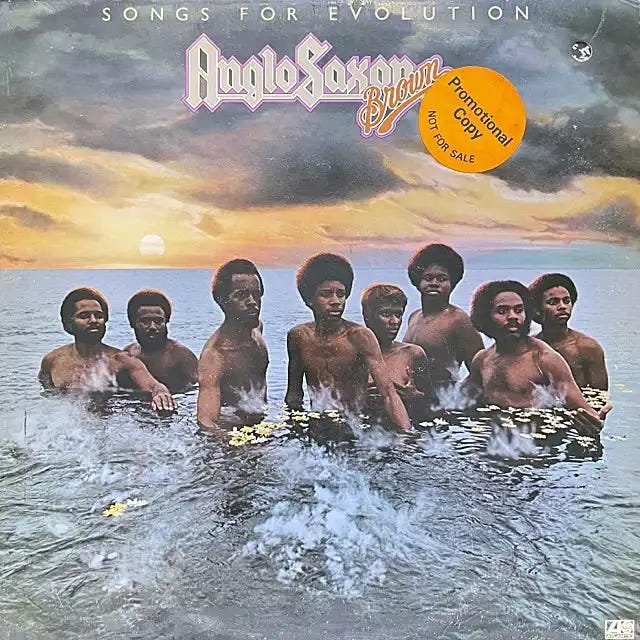Today's discovery comes from our friend Chris Dalla Riva, who runs one of our favorite Substacks, Can't Get Much Higher. This Substack focuses on the fascinating interaction between music and data. Make sure to subscribe below.
Now, let's hear from Chris.
A few weeks ago, I came across a decade-old note on my phone with music that I had intended to buy. I'd never heard most of songs, probably because I got Spotify later that year and stopped buying stuff as regularly soon after. Still, even if I didn't know the songs, most of the artists were familiar to me. Except one. Anglo-Saxon Brown. A quick search turn them up. They were very obscure. They released a single album in 1970s and then were never heard from again. I don't know why. The album was filled with some of the best Philly soul that I'd ever come across, the best of which was "Call On”
-
"Call on" by Anglo-Saxon Brown
Released - 1970
We hadn't heard Anglo-Saxon Brown before—have you?
If you've got any other great recommendations like this, please drop them in the comments below!






Great track! I had never heard of Anglo Saxon Brown. 1976 (when the album was released on Atlantic Records), I was on-air on a commercial FM rock station (WFMF, Baton Rouge, LA), so we wouldn't have had the album in the control room. The cover looks vaguely familiar, as the next year, I started working at a large retailer in Houston, Cactus Records, and we certainly would've had it in stock.
Here's some context: In 1976, The Spinners were on Atlantic, and label-mates with ASB. This fills in a huge hole for me, in that I thought The Spinners (about whom I've written several articles...feel free to nose around FRONT ROW & BACKSTAGE for them!) were the only act on the Atlantic roster to record at Philadelphia's Sigma Sound Studios. Turns out ASB did, as well.
Not a big deal really, but usually, the only acts to record at Sigma were those signed to Philadelphia International Records, the CBS-distributed label founded and run by legends Kenny Gamble, Leon Huff, and the late Thom Bell (about whom I've written more than a couple articles). But, as MFSB (Sigma's house band...think Wrecking Crew or Motown's Funk Brothers....who only played on and for Motown Records' artists) drummer, Earl Young, once said (I'm paraphrasing), "As long as someone brings a check, they can record at Sigma!" https://bradkyle.substack.com/p/audio-archaeology-the-birth-of-disco?utm_source=publication-search
In 1973, The Spinners, who had just left Motown (after 2 albums), signed with Atlantic. They went to Sigma, and recorded their self-titled debut album for the label, produced by Thom Bell (with the MFSB--Mother Father Sister Brother session players). Right outta the box, these singles: "I'll Be Around" #1, "Could It Be I'm Falling in Love" #4, "One of a Kind (Love Affair)" #11, and a couple others off the album that charted.
Seven more albums followed, into 1979, with all being recorded at Sigma (with MFSB), with Thom Bell producing, and each, to varying degrees, producing hit and charting singles. Clearly, this was a working formula.
Ahmet Ertegun and Atlantic, understandably, were anxious to see if new signee, Anglo Saxon Brown, could replicate the formula, this time with a female lead singer. It's interesting to notice that "Then Came You" (The Spinners with Dionne Warwick, produced, arranged and conducted by Thom Bell) was released in July 1974, so it may be no accident that the label wanted to see if the Sigma magic could work again with a female lead, and using many of the same elements that fueled The Spinners' success.
The only problem? Thom Bell didn't produce (likely too busy with The Spinners)! Other factors play into (as we know!) whether a record gets airplay, and the resultant sales that make a "hit"! Songwriters Charles Simmons and Joe Jefferson produced (and, with Dwight Smith, arranged), and, while they wrote every song on the ASB album, I'm unsure of their experience in producing. Simmons and Jefferson were, by this time, proven hit songwriters as part of the stable of songwriters at Philly International, so no problem with quality songs!
Short of a running history on ASB (there's no Wiki page on the band!), here's my guess: Simmons and Jefferson discovered the group, likely brought them to PIR (Philly Internat'l Records/CBS), who may have declined. They signed with Atlantic, and the duo suggested to Ertegun they bring them into Sigma to give them the whole Sigma/MFSB package! All that's a guess, but it seems likely, and it helps explain why Simmons and Jefferson wanted such "ownership" of the group and their sound (writing all the songs and producing).
Simmons and Jefferson were behind the creation of many (if not most) of the Spinners' previous three years of hits at Sigma for Atlantic Records! So, I'm willing to bet the ASB album is chock full of bangin', of-the-era smooth soul and quality disco rhythms. Possibly, without Thom Bell's production savvy and usual arranging and conducting skills on the record, the usual Philly "magic" wasn't there.
But, with so many other successful Sigma/PIR elements present (https://www.discogs.com/release/1287373-Anglo-Saxon-Brown-Songs-For-Evolution), I'm willing to bet the album is a fun listen, and I KNOW, without even hearing it (oh, but I will!), it's a beautiful snapshot of a time when hits galore were being produced at the home of smooth and meaningful soul music that wasn't selling out to the disco-floor madness that was just around the corner!
Great find, Chris, and way to trumpet, Songletter!
The album was recently reissued on CD by the amazing reissue label Soul Music Records.